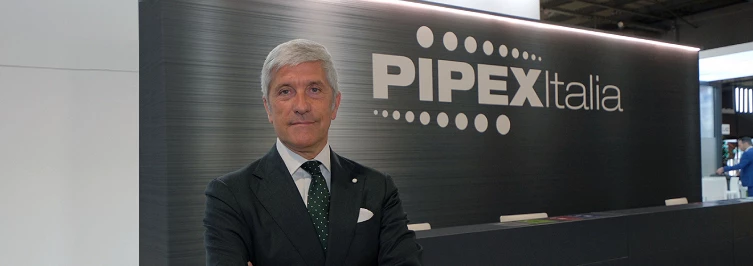An intergenerational language: Siderweb’s interview with Luigi Cuzzolin.
During the 2023 edition of Made in Steel, the international Steel Conference and Exhibition, our CEO Luigi Cuzzolin, who is also the Vice President of Made in Steel, discussed with Siderweb on the importance of finding the most effective way to communicate with young people. Because the central theme of this tenth edition of the steel fair was focused on generational transition, an essential element for facing the future of the steel industry.
Cuzzolin emphasized the urgency of creating a new language capable of bridging the two worlds, the next generation and the executive generation: “We must communicate using the language of young people: algorithms, technologies, films, videos, and social media“, declared our CEO. This is because it is crucial to combine the experience of the older generation with the energy of the new one.
During the interview, the topic of decarbonization was also addressed, highlighting the importance of involving the entire steel supply chain in understanding the costs and additional efforts necessary to achieve this crucial goal for the steel industry.
You can find the original interview at this link but, for your convenience, we include the English translation below.

Luigi Cuzzolin (Pipex Italia): “A new language to bring together two worlds that must coexist.”
Pipex Italia was established in 1993 as the commercial organization of one of the main European producers of seamless steel pipes. It is a historical presence at Made in Steel. With Luigi Cuzzolin, CEO of Pipex, one of the founders of Siderweb and vice president of Made in Steel, we discuss the 2023 edition of the conference & exhibition and the prospects of the steel market.
How do you judge the 2023 edition?
We have always attended trade fairs. We believe in Made in Steel because it is a somewhat different event from traditional ones and it has focused a lot on gathering people. It has been a complex journey that has been successful over the years. This year’s edition seems to be a record-breaking one, at least according to the numbers. There are a lot of people coming from all corners of the world, and we have always pushed for internationalization. We are an international company, representing seven groups covering four continents.
The market in the first months of the year has shown better performance than expected. Do you think this trend will continue?
The first months of the year went better than we expected, although there was a realignment of prices, which is quite natural considering the levels we had reached. Now we are entering a more delicate phase. The market has slowed down, not because the demand has ceased, as it is there and hidden. However, people want to understand what will happen because there are too many uncertainties or problems related to interest rates, inflation, and the war in Ukraine. The sector is reflecting, and I believe that Made in Steel is the best place to make these reflections and start June with clearer ideas for orders.
From your perspective, what percentage of an impact is the war in Ukraine having on the steel market?
If we look at the numbers, the impact of the war in 2022 was almost close to zero; in fact, we all achieved important results. Ukraine had tariffs on almost all steel products. Since the war broke out, the steel borders have opened, so there are no longer any quotas or tariffs. Ukraine is now entering Europe more than it did before, and we are noticing it. In the tube sector, for example, we are beginning to feel this presence, which, combined with concerns about Chinese imports, is generating worries. As for the sectors we follow, Russia has never been a serious problem. The tariffs have remained.
One of the key themes of this edition of Made in Steel is the generational transition. What elements do you think the steel industry should pay attention to in this process?
The reason why I decided to take on this challenge with Emanuele Morandi over twenty years ago was because we had to start thinking about a different future for the steel industry, one based on interaction, communication, and education. You don’t replace one generation with another. We need to maintain the experience of the older generation and combine it with the energy of the new one. The real issue is finding a way to communicate between generations. We need to create a new language to bring together these two worlds that must coexist. We need to start telling our story to the outside world, explaining that our industry is fantastic, innovative, the world’s leading circular economy, and that it is investing in decarbonization. We need to communicate using the language of young people, algorithms, technologies, videos, social media.
At the inauguration of this edition of Made in Steel, it was mentioned that there was difficulty in conveying the industry’s story to the outside world. In your opinion, have we won the bet and has the steel industry managed to tell its story better over these twenty years?
As far as I’m concerned, yes. What we still need to do to complete the circle is to make Italian steel perceived as a unique Dolomite block. We need to go to international markets and say, “We are Italian steel.”
At the inauguration, the President of Federacciai, Antonio Gozzi, said that the Italian steel industry can achieve the goal of green steel by 2030. Do you think it is an achievable milestone?
I am convinced that we have the technical capabilities and the people to achieve this goal. However, decarbonizing and saving the planet cannot be done at zero cost. There is a cost, and it must be supported by the entire supply chain. Steelmakers need to understand that in addition to the efforts already made, there will be more to do. And we must be able to communicate and have the market reward us for these efforts. Not excessive profits: we must earn what is fair, and everyone has to do their part. Steel is decarbonizing, we are investing in people and technologies, and the costs must be shared between us and the market. Decarbonization must also be economically sustainable.
Paola Gregorio
We thank Siderweb for the kind concession.
Article written by:

Marketing & Communication Department
Pipex Italia
For more information, details or requests, don’t hesitate to contact us at marketing@pipex.it.
Don’t miss out on our news and initiatives, read our BLOG and subscribe to our Newsletter.

 infopipex@pipex.it
infopipex@pipex.it
